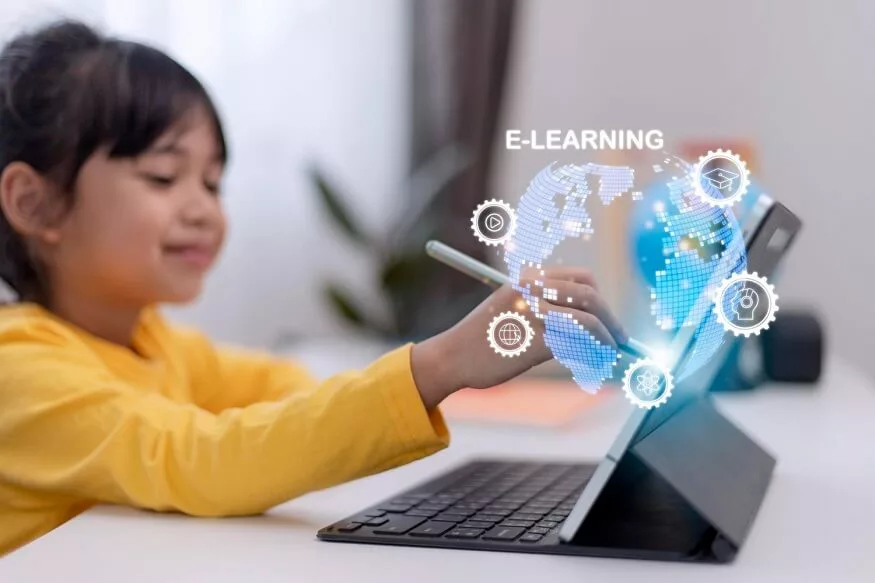In a world that is driven by technological advances and is changing quickly, educational institutions must stay up with the digital era. The Council for the Indian School Certificate Examinations (ICSE), which has made great strides in integrating digital learning initiatives into its curriculum, has drawn attention to this demand. In this we will look at the ICSE’s digital curriculum, e-learning initiatives, and how its technologically advanced curriculum is changing the face of education.
Also Read : Understanding the ICSE Curriculum for Primary Education
Digital Curriculum in ICSE
The digital curriculum in ICSE signifies a shift from traditional paper-and-pencil learning to a more dynamic and interactive educational experience. This transformation is evident through various components that encompass the tech-driven ICSE curriculum.
1. E-Books and Online Resources
A crucial part of the digital curriculum in ICSE is the integration of e-books and online resources. These materials offer students affordable and easily accessible alternatives to traditional textbooks. Designed to be interactive and compatible with multiple devices, they provide flexibility for on-the-go studying. Moreover, these e-books often include multimedia elements, enhancing the visual appeal and effectiveness of learning. By offering digital textbooks and resources, ICSE enables students to keep their backpacks lighter and their learning more portable.
2. Interactive Learning Platforms
ICSE has embraced interactive learning platforms, which are instrumental in fostering a student’s understanding of the curriculum. These platforms offer features like multimedia lessons, quizzes, and collaborative tools that promote active participation and self-assessment.
Interactive learning platforms also empower teachers by giving them tools to track student progress and tailor their teaching methods accordingly. By using such platforms, ICSE creates an environment where learning becomes a two-way street, promoting the active involvement of both students and educators.
3. E-Learning Modules
The incorporation of e-learning initiatives in the ICSE curriculum further exemplifies its commitment to digital learning. These modules include video lectures, virtual labs, and simulations that help students grasp complex concepts with ease.
For instance, in science subjects, students can perform virtual experiments, enhancing their practical understanding of theories. This not only makes learning more enjoyable but also bridges the gap between theoretical knowledge and its practical application.
Also Read : The Importance of ICSE approved Textbooks in Schools
E-Learning Initiatives in ICSE
The concept of “e-learning initiatives” describes a variety of ICSE-led initiatives, efforts, and promotions that support digital education. With the help of these programmes, education will be more readily available, the learning experience will be enhanced, and students will be better equipped to meet the challenges of the digital age.
1. Exams and tests offered online
ICSE has introduced online assessments and examinations that are conducted electronically. Students can quickly determine their strengths and weaknesses thanks to the frequent rapid feedback and results that come with online examinations. They may concentrate on what needs work and enhance their time management abilities as a result.
2. Teacher Training Programs
E-learning initiatives in ICSE value educators by providing training programs to equip them with digital teaching skills. These programs emphasize not only subject knowledge but also effective digital engagement techniques in the classroom.
3. Virtual Field Trips
To enhance students’ understanding of various subjects, ICSE has introduced virtual field trips. Without ever leaving the classroom, these field trips take students on virtual expeditions to historical landmarks, museums, and even foreign locations. This programme not only widens students’ horizons but also assists them in making the connection between their academic learning and practical experiences.
Also Read : Teaching Methodologies in ICSE Board Schools for Young Learners
Tech-Driven ICSE Curriculum
The term “tech-driven ICSE curriculum” signifies a curriculum that is shaped by technology, integrating it seamlessly into the learning process.
1. Blended Learning
ICSE has adopted a blended learning approach, which combines traditional classroom teaching with digital resources. This allows students to access educational content both in the classroom and at home, enhancing their learning experience and catering to diverse learning styles.
Blended learning also empowers teachers to personalize instruction, adapting it to the needs and pace of individual students. It has proven to be particularly effective in catering to the unique learning requirements of each student.
2. Integration of Artificial Intelligence
Artificial Intelligence (AI) is an integral part of the tech-driven ICSE curriculum. AI-powered systems are used to assess student performance, identify areas where students need additional support, and provide targeted resources for improvement. This personalized learning approach ensures that no student is left behind and that each can progress at their own pace.
3. Gamification of Learning
ICSE has recognised the potential of gamification in education. By incorporating game elements into the curriculum, students become more engaged and motivated. Gamification makes learning fun and encourages students to participate actively in their education.
Also Read : ICSE Board Examinations: Preparation and Success Tips for Class 10
Digital Learning Benefits for ICSE Students
The digital curriculum, e-learning initiatives, and tech-driven approach in the ICSE curriculum offer numerous advantages to students.
1. Enhanced Engagement
Digital learning, with its interactive content and multimedia elements, keeps students engaged. It appeals to a generation raised in a digital environment, making the learning process more enjoyable and effective.
2. Accessibility
Digital resources are readily accessible, enabling students to study from anywhere, at any time. This flexibility is invaluable, especially for those who have other commitments or live in remote areas.
3. Personalised Learning
Tech-driven ICSE curriculum, with AI and personalized assessments, tailors education to individual student needs. This ensures that students receive the support and resources necessary for their growth.
4. Environmental Responsibility
The shift to digital resources and online assessments contributes to a more sustainable and eco-friendly education system, reducing paper usage and environmental impact.
5. Readiness for the Digital Age
By adopting e-learning initiatives, ICSE prepares students for a future where digital skills are essential. They become proficient in using technology, which is a valuable asset in both further education and the job market.
Challenges of Digital Learning in ICSE
While the digital learning initiatives in the ICSE curriculum have brought about numerous benefits, there are also challenges that need to be addressed.
1. Infrastructure
Access to digital resources and technology varies across regions. Some students may not have the necessary devices or reliable internet connections, limiting their access to online learning materials.
2. Teacher Training
Implementing a tech-driven curriculum effectively requires well-trained educators. Ensuring that teachers are proficient in the use of digital tools and resources is an ongoing challenge.
3. Digital Fatigue
Over Reliance on digital tools can lead to digital fatigue, where students become overwhelmed by the constant screen time. Striking a balance between online and offline activities is essential.
4. Security and Privacy
Concerns about student privacy and data security are brought up by the use of internet platforms. A key focus is to safeguard student data and provide a secure internet environment.
Also Read: How to Choose: Best CBSE & ICSE School Near Me
Conclusion
The latest example of how education is changing in the digital age is the presence of digital learning initiatives in the ICSE curriculum. The digital curriculum, e-learning initiatives, and tech-driven approach have transformed the way students learn and prepare for the future.
While challenges exist, the benefits of digital learning in ICSE are undeniable. Students are more engaged, learning is personalised, and they acquire essential digital skills. As the ICSE curriculum continues to evolve, it holds the promise of providing a well-rounded education that equips.
When it comes to embracing and integrating digital learning initiatives within the ICSE curriculum, EuroSchool has been leading. EuroSchool has smoothly combined e-learning tools, tech-driven methodologies, and digital resources into their curriculum because they understand how important it is to stay relevant in the always changing educational landscape. By effectively combining traditional classroom learning with advanced digital technology, EuroSchool makes sure that students are academically adept and prepared for the digital era.
With the help of this approach, students are given the tools they need to succeed in the twenty-first century, which enhances engagement among learners and promotes personalized education. The ICSE curriculum’s inclusion of digital learning initiatives is a reflection of EuroSchool’s commitment to giving its students a dynamic and successful educational experience.










